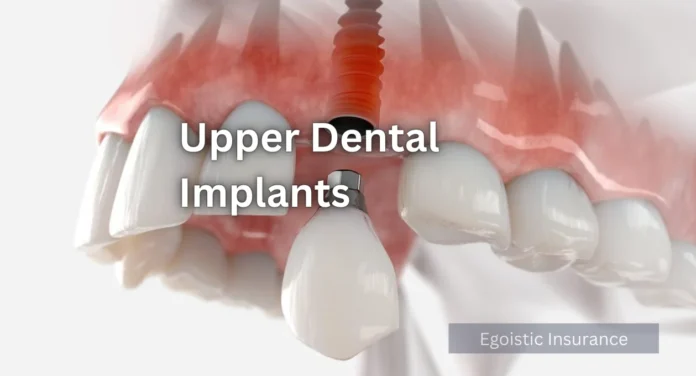Dental implants are a revolutionary solution for missing teeth, offering a durable and aesthetically pleasing option for restoring your smile. If you’re considering implants for your upper jaw, understanding the different aspects can help you make an informed decision. This guide explores various aspects of upper dental implants, including procedures, options, and costs.
The procedure for upper dental implants typically begins with a thorough examination of your oral health, including imaging studies to assess bone density. Once it’s determined that you’re a good candidate, the implant placement procedure can commence, usually under local anaesthesia. During this process, a titanium post is surgically inserted into the jawbone, serving as a strong foundation for the replacement tooth. After healing, which may take several months, an abutment is attached, followed by the final restoration—a custom-made crown that mimics the appearance of a natural tooth.
Upper Jaw Dental Implants
Upper jaw dental implants are designed specifically for replacing missing teeth in the upper jaw. Unlike the lower jaw, the upper jawbone can be softer and more prone to bone loss, which can affect the success of dental implants. This means that special considerations and techniques might be necessary to ensure a successful implant placement.
When selecting implants for the upper jaw, it’s essential to consult with a dental professional who specializes in implantology. They will evaluate your unique situation, considering factors like bone quality and the position of surrounding teeth. Advanced imaging techniques, such as 3D scans, may be employed to create a precise treatment plan tailored to your needs. This personalised approach enhances the likelihood of a successful outcome and accelerates your recovery.
Post-operative care is crucial for the long-term success of upper dental implants. After the procedure, adhering to your dentist’s aftercare instructions can significantly impact healing and implant stability. Regular follow-up appointments will allow your dentist to monitor the progress and address any potential complications promptly. By maintaining good oral hygiene and a healthy lifestyle, you can ensure the longevity of your dental implants and enjoy a renewed smile for years to come.
Top Dental Implants
When referring to “top dental implants,” we’re talking about the highest quality implants available. These are often made from high-grade titanium or zirconia and are known for their durability and natural appearance. The best implants also come from reputable manufacturers and have a high success rate.
The healing process after upper dental implant placement is crucial for ensuring the longevity and success of the implants. Patients are often advised to adhere to a soft diet initially, allowing the surgical sites to recover without undue stress. Pain management strategies, including prescribed medications, can help alleviate discomfort during this period. Additionally, maintaining strict oral hygiene practices is vital to prevent infection and promote optimal healing.
Dental Implants for Upper Teeth
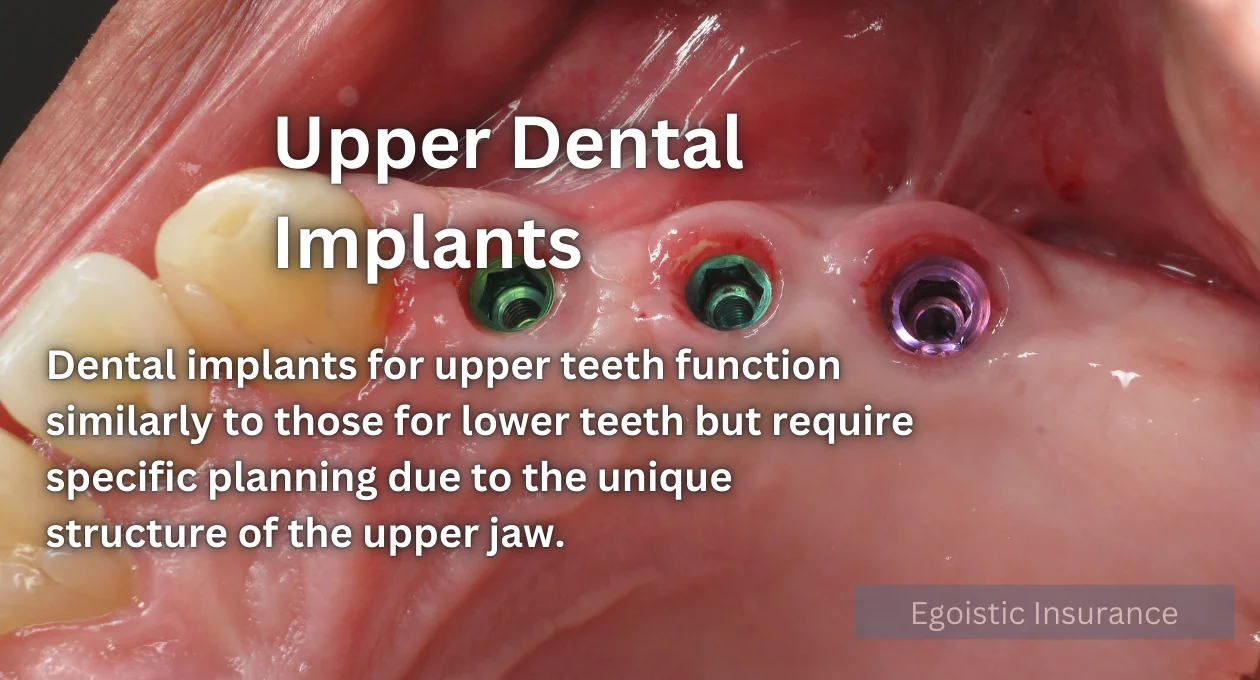
Dental implants for upper teeth function similarly to those for lower teeth but require specific planning due to the unique structure of the upper jaw. The procedure involves placing a titanium post into the jawbone, which then integrates with the bone over time. A crown or bridge is placed on top to restore function and appearance.
One of the significant advancements in dental implant technology is the development of mini dental implants. These smaller implants are especially beneficial for patients with limited jawbone density, as they require less bone structure for placement. Mini implants can often be placed with less invasive procedures, resulting in quicker recovery times and less discomfort. They provide a cost-effective alternative while still offering adequate support for dentures or single crowns.
Another essential consideration for upper dental implants is the role of bone grafting. In cases where there is insufficient bone to support an implant, a bone graft may be necessary to enhance the jaw structure. This procedure involves transplanting bone material, which can be sourced from another part of the body or synthetic options. Bone grafting can significantly improve the success rate of implant placement, ensuring a solid foundation for long-lasting dental restorations.
Implant-Supported Upper Dentures
Implant-supported upper dentures are an advanced option for those who have lost multiple upper teeth. Instead of using traditional dentures that rest on the gums, implant-supported dentures are anchored to dental implants. This provides a more stable and secure fit, reducing the discomfort and potential for slipping that often occurs with traditional dentures.
Implant-supported upper dentures offer several advantages over traditional dentures, including improved chewing function and enhanced comfort. Patients often report greater confidence when speaking and eating, as these dentures are designed to stay firmly in place. The integration of implants also prevents bone loss in the jaw, promoting better overall oral health. Working closely with a dental implant specialist will ensure that the dentures are customised for a perfect fit, resulting in a functional and natural-looking smile.
Upper Arch Dental Implants
Upper arch dental implants are used to replace all the teeth in the upper jaw. This solution involves placing multiple implants throughout the upper arch to support a full set of replacement teeth. It is a popular choice for patients who have lost most or all of their upper teeth and want a comprehensive restoration.
Choosing the right type of upper arch dental implants is crucial for achieving optimal results. Factors such as the patient’s overall health, jawbone condition, and lifestyle play a significant role in determining the best approach. A thorough consultation with an experienced dental implant specialist can help identify the most suitable options and establish a tailored treatment plan that meets individual needs and preferences.
After the placement of upper arch implants, ongoing care becomes paramount. Regular dental check-ups and professional cleanings are essential to maintain both the implants and surrounding gum health. Patients should also practice at-home oral hygiene routines diligently, as this will greatly contribute to the longevity of the implants and the overall success of the restorative solution. By prioritizing both professional and personal care, patients can enjoy a functional and aesthetically pleasing smile for years to come.
Full Upper Dental Implants
Upper dental implants are similar to upper arch implants but typically involve a complete replacement of all upper teeth with a fixed prosthesis. This option is ideal for patients who need a complete restoration and seek a permanent solution that mimics the look and function of natural teeth.
Selecting the right dental implant solution can significantly impact both function and aesthetics. Patients are encouraged to discuss their goals and concerns with their dental professional to arrive at the best choice for their needs. Understanding the different types of implants, including full upper implants or mini options, can help in making an informed decision. Ultimately, a collaborative approach between patient and provider ensures a tailored treatment plan that fosters confidence and satisfaction with the final results.
Upper Jaw Implant Procedure
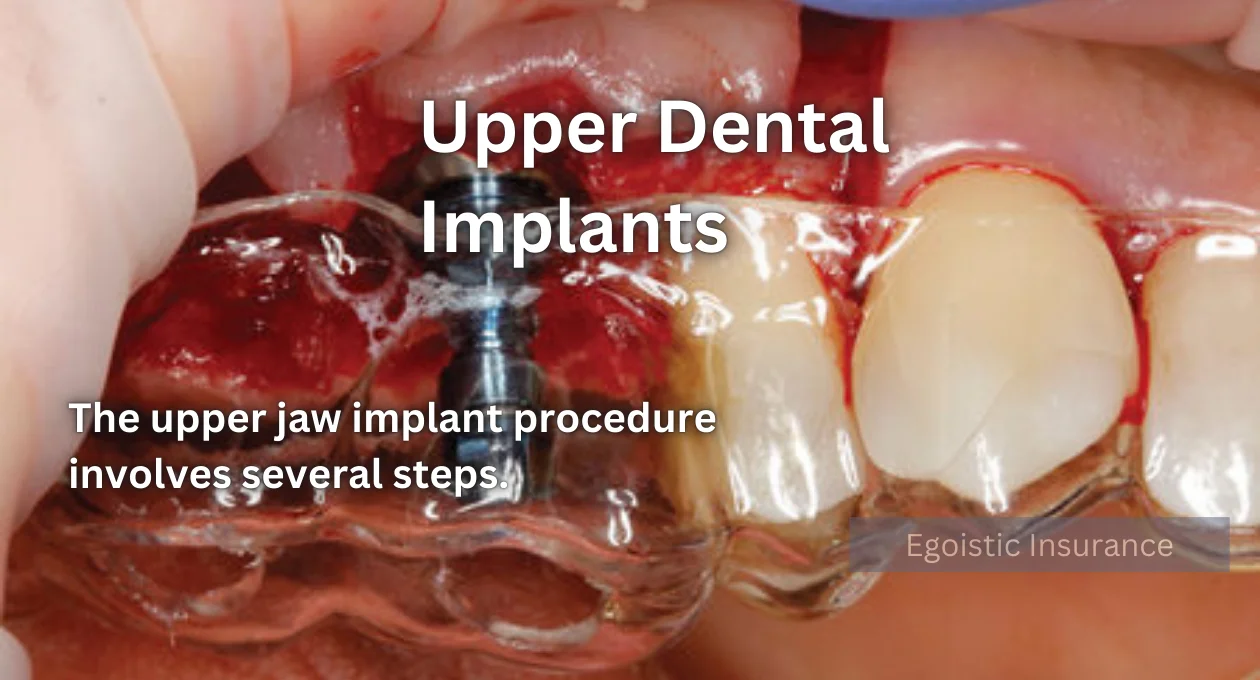
The upper jaw implant procedure involves several steps. First, a thorough examination and imaging are conducted to assess bone density and structure. If necessary, bone grafting may be performed to ensure adequate support. Next, implants are placed into the jawbone, and a healing period follows to allow the implants to integrate with the bone. Finally, the permanent restoration is attached.
Single Tooth Upper Dental Implants
For individuals missing just one tooth in the upper dental implants, single tooth upper dental implants offer a precise and effective solution. This involves placing a single implant and attaching a crown that matches the surrounding teeth. This option preserves adjacent teeth and provides a natural-looking result.
In addition to the physical benefits of dental implants, they also significantly enhance a patient’s quality of life. Patients often experience improved confidence in their smile, making social interactions more comfortable and enjoyable. Furthermore, implants can restore proper chewing function, enabling individuals to enjoy a wider range of foods again. The overall psychological impact of having a complete and functional set of teeth cannot be underestimated, as it greatly contributes to self-esteem and well-being.
Upper Implant Restoration
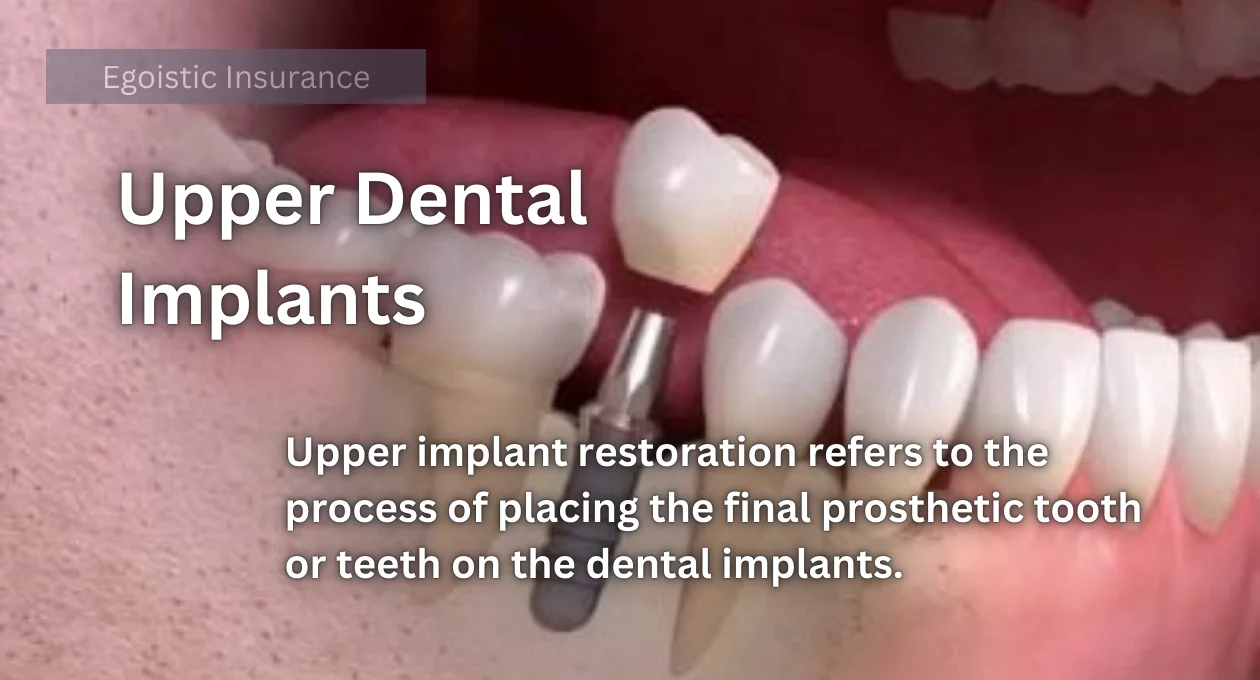
upper dental implants refers to the process of placing the final prosthetic tooth or teeth on the dental implants. This includes attaching crowns, bridges, or dentures to the implants. Proper restoration is crucial for ensuring the functionality and aesthetic appeal of the implants.
Successful upper implant restoration requires careful planning and execution to achieve optimal results. The restoration process begins after the implants have fully integrated with the jawbone, allowing for a secure and stable foundation. Dental professionals will customise the prosthetic teeth to match the patient’s natural tooth colour, size, and shape, ensuring a seamless appearance. Regular follow-up appointments are essential to monitor the health of the implants and the surrounding tissue, contributing to the longevity of the dental restoration.
Best Upper Dental Implant Options
The best upper dental implant options depend on individual needs and preferences. Factors to consider include the type of implant (titanium or zirconia), the implant design, and the specific restorative solutions available. Consulting with a skilled dental professional will help determine the most suitable option for your situation.
When considering dental implants, it’s essential to understand the variety of options tailored to individual circumstances. Many patients benefit from a detailed discussion with their dental implant specialist, who can explain the advantages and disadvantages of each type. Incorporating personal preferences, lifestyle, and oral health conditions into the decision-making process will lead to a more satisfactory outcome. A well-informed patient is likely to experience greater confidence in their chosen treatment path, knowing it aligns with their unique needs.
Cost of Upper Dental Implants
The cost of upper dental implants varies based on several factors, including the number of implants needed, the type of restoration, and the complexity of the procedure. On average, upper dental implants can range from $3,000 to $6,000 per implant. It’s essential to discuss costs with your dentist and explore financing options if needed.
After choosing the appropriate upper dental implant solution, patients should also be informed about the potential long-term maintenance required. This includes understanding the importance of regular dental visits, as adjustments may be necessary to ensure the implants remain comfortable and functional over time. Moreover, lifestyle factors such as diet and habits can influence the longevity of the implants, making patient education vital. By remaining proactive in their oral health care, patients can maximize the benefits of their dental implants for years to come.
Upper Dental Implant Surgery
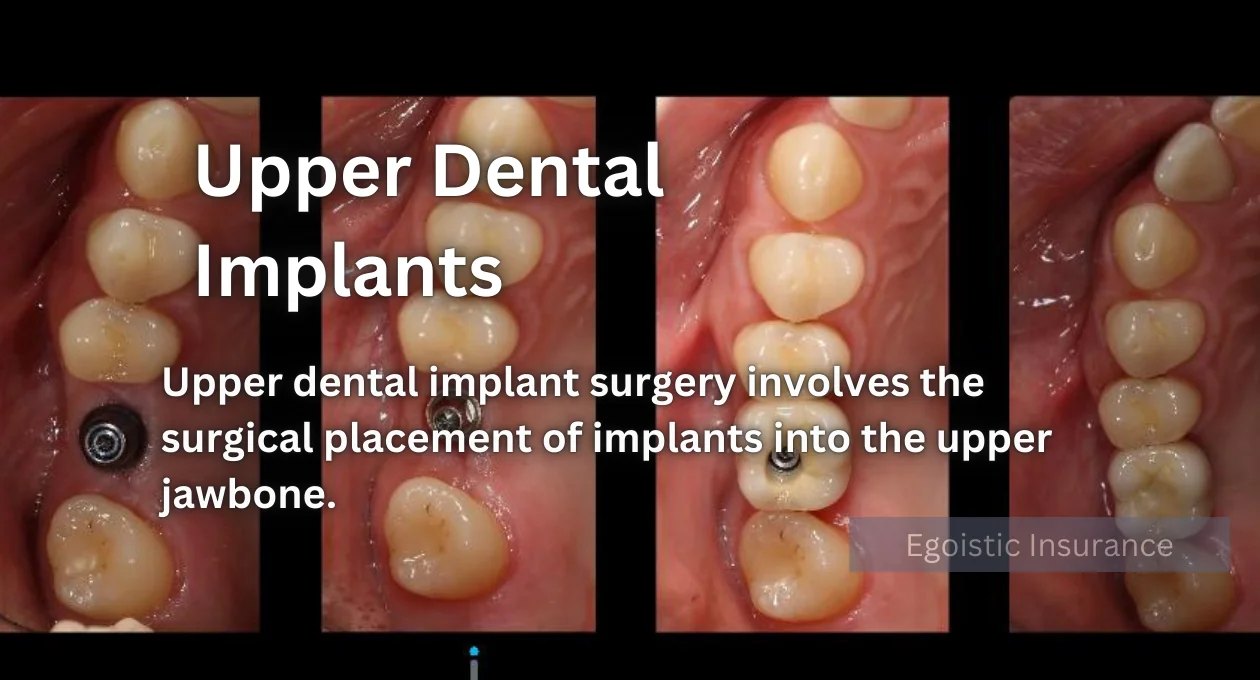
Upper dental implant surgery involves the surgical placement of implants into the upper jawbone. This procedure is typically performed under local anesthesia and may require sedation. The surgery is minimally invasive, but a recovery period is necessary to ensure proper healing and integration of the implants.
Following the upper dental implant surgery, patients will receive detailed postoperative care instructions to promote healing and minimize discomfort. It is essential to adhere to these guidelines, including maintaining oral hygiene and avoiding hard or chewy foods for a specified period. Pain management may also be addressed through prescribed medications or over-the-counter options as needed. Regular follow-up visits will be scheduled to monitor progress and ensure the implants are integrating correctly with the bone.
Upper Implant Treatment Plan
An upper implant treatment plan is a comprehensive approach to addressing tooth loss in the upper jaw. This plan includes diagnostic assessments, treatment options, surgical procedures, and post-operative care. A detailed treatment plan ensures that all aspects of the implant process are carefully considered and tailored to meet the patient’s needs.
In conclusion, upper dental implants offer a range of solutions for restoring missing teeth in the upper jaw. Whether you need a single tooth replacement or a full arch restoration, understanding the different types of implants and procedures can help you make the best choice for your dental health. Consult with a dental professional to explore your options and find the most effective solution for your needs.
FAQs
What are dental implants?
Upper Dental implants are artificial tooth roots made typically from titanium that are surgically placed into the jawbone to support replacement teeth or bridges. They offer a durable and long-lasting solution for missing teeth.
How long do dental implants last?
With proper care and maintenance, dental implants can last many years, often a lifetime. Regular dental checkups and good oral hygiene practices are essential to maximize their longevity.
Is the dental implant procedure painful?
Most patients report that the dental implant procedure is relatively painless, especially with the use of local anesthesia or sedation. Post-operative discomfort can usually be managed with prescribed pain relief medications.
How long does the recovery take after implant surgery?
The recovery period after dental implant surgery varies by patient but generally takes a few days to a week for initial healing. Complete integration with the jawbone may take several months, depending on individual healing rates and bone quality.
Are there any dietary restrictions after getting dental implants?
Yes, patients are typically advised to avoid hard, chewy, or sticky foods for a few weeks following the surgery to allow the implants to properly heal and integrate with the jawbone. Soft foods are usually recommended during this initial recovery period.
Can anyone get dental implants?
Most people are suitable candidates for dental implants; however, factors such as overall health, bone density, and oral hygiene practices can affect eligibility. A thorough evaluation by a dental professional is necessary to determine if implants are right for you.
Conclusion
In summary, upper dental implants represent a significant advancement in restorative dentistry, providing a reliable and aesthetically pleasing solution for those experiencing tooth loss. With a variety of options available and the potential for long-term success, patients are encouraged to engage in thorough discussions with their dental professionals to tailor a treatment plan that best suits their individual needs. By understanding the process, costs, and care required, patients can approach their dental implant journey with confidence, ultimately achieving improved oral function and enhanced quality of life. Whether opting for a single implant or a full arch restoration, the benefits of upper dental implants can contribute significantly to one’s overall dental health and self-esteem.
When considering upper dental implants, it’s also important to discuss the potential risks and complications associated with the procedure. While dental implants are generally safe, possible issues can arise, such as infection, nerve damage, or sinus problems for those receiving implants in the upper jaw. Patients should have an open dialogue with their dental professional to fully understand these risks and ensure they are well-prepared for the procedure. By addressing these concerns upfront, individuals can alleviate anxiety and make informed decisions about their dental health.
For more interesting information keep visiting egoisticinsurance.online


